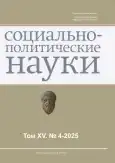Traditions or innovations: what is the path of modern Russian higher education?
- 作者: Orekhovskaya N.A.1, Garaeva G.F.1
-
隶属关系:
- Financial University under the Government of the Russian Federation
- 期: 卷 15, 编号 4 (2025)
- 页面: 281-288
- 栏目: Social and Political Philosophy
- URL: https://journals.eco-vector.com/2223-0092/article/view/693270
- DOI: https://doi.org/10.33693/2223-0092-2025-15-4-281-288
- EDN: https://elibrary.ru/XYWDZE
- ID: 693270
如何引用文章
详细
The work is devoted to the study of issues about the possibility, necessity and possible effect of moving away from traditional methods of teaching and upbringing in education to such innovative and other progressive methods, forms and methods of teaching. The purpose of the work is to analyze the methods of teaching and upbringing in the paradigm of the processes of globalization and digitalization of Russian society. The novelty lies in the assessment of the destructive influence exerted on the immature minds of students through the media, Internet resources, and mass media. As part of the study, the authors reflect that when approaching the issue of introducing technological innovations into the educational process, it is necessary to comprehensively take into account psychological, age, physiological, cognitive, social and communicative and other characteristics, as well as needs. It is also possible to note the absence of any need, and to some extent even harmfulness for the education system, of a departure from traditional approaches and switching exclusively to progressive and innovative teaching methods, including, among other things, an exclusively individualistic approach to students, education based on modern values in the paradigm of the existing reality, as well as the introduction of digital and information and communication technologies in the educational process. As a result of the study, it is concluded that this system requires a filigree balance of traditional approaches based on many years of proven experience, as well as the possibility of combining them with progressive teaching methods that complement the already strengthened and proven methods and techniques of education and training of children, adolescents and young people.
全文:
作者简介
Natalia Orekhovskaya
Financial University under the Government of the Russian Federation
编辑信件的主要联系方式.
Email: naorehovskaya@fa.ru
SPIN 代码: 2650-7619
Dr. Sci. (Philos.), Professor, Professor, Department of Humanities
俄罗斯联邦, MoscowGalina Garaeva
Financial University under the Government of the Russian Federation
Email: gfgaraeva@fa.ru
SPIN 代码: 8847-1680
Dr. Sci. (Philos.), Professor, Professor, Department of Humanities
俄罗斯联邦, Moscow参考
- Bakuradze A.B. The essence, values and models of education. Bulletin of Tver State University. Series: Philosophy. 2022. No. 2 (60). Pp. 56–62. (In Rus.)
- Bronfenbrenner U. Two worlds of childhood: Children in the USA and the USSR. Moscow: Progress, 1976. 190 p.
- Zinchenko V.O. The problem of the value of education in the context of its digitalization. In: Materials from the pool of scientific and practical conferences: III National Scientific and Practical Conference with international participation, VI International Scientific and Practical Conference, III International Scientific and Practical Conference and the Scientific and Practical Conference with International Participation (Donetsk–Kerch–Lugansk, January 24–28, 2022). Kerch: Kerch State Marine Technological University, 2022. Pp. 416–419.
- Kondakova I.V. Problems and risks of digitalization of the education system. The World of Pedagogy and Psychology. 2022. No. 11 (76). Pp. 36–40. (In Rus.)
- Makaev H.A. Value orientations and moral attitudes of modern Russian youth. Social and Humanitarian Knowledge. 2017. No. 6. Pp. 115–123. (In Rus.)
- Mikhalkina S.A., Pyrcheva E.E., Bezborodova V.I. The problem of the influence of devices and gadgets on the development of preschool children. Current Problems and Prospects of Modern Psychology Development. 2021. No. 1. Pp. 26–31. (In Rus.)
- Novikov N.I. The positive and negative impact of gadgets on child development. Modern Scientific Research and Innovation. 2022. No. 3 (131). Pp. 1–4. (In Rus.)
- Solovyov V.V. Essays in two volumes. Vol. 1: Justification of goodness. Moscow, 1988. 899 p.
- Subbotina N.D. Traditional and civilized: two types of education. Humanitarian Vector. Series: Philosophy, Cultural Studies. 2016. No. 11. Pp. 73–81. (In Rus.)
- Kanbay Y. Digital amnesia: The erosion of memory. Current Approaches in Psychiatry. 2024. Vol. 17. Pp. 544–553.
补充文件










